Venezuela's Supreme Court has banned opposition leader Juan Guaidó from leaving the country and frozen his bank accounts.
The move comes amid an escalating power struggle, after Mr Guaidó declared himself interim president last week.
He has been backed by the US and other countries. President Nicolás Maduro has major allies too, including Russia.
Mr Maduro said in an interview that he was prepared to hold negotiations with the opposition.
"I am ready to sit down at the negotiating table with the opposition so that we could talk for the good of Venezuela," he told the Russian state news agency RIA Novosti in Caracas.
Mr Maduro ruled out an early presidential election - saying the next one was not due until 2025 - but said he would support early parliamentary elections as "a good form of political discussion".
On Saturday, the European Union gave President Maduro an ultimatum to call elections within eight days, or the bloc would recognise Mr Guaido as president.
The opposition has asked supporters to take part in a two-hour peaceful protest on Wednesday. It is as yet unclear if Mr Guaidó will attend.
A group of North and South American countries has meanwhile opposed any outside military involvement in the country.
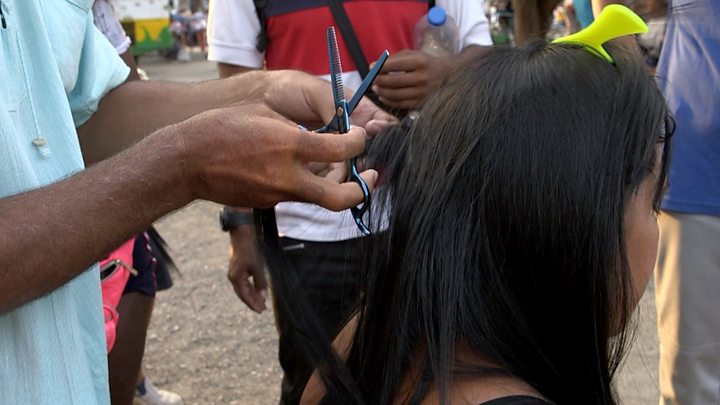
Peru's Foreign Minister Nestor Popolizio said the Lima Group - a 14-country body including Canada set up in 2017 to find a peaceful solution to the crisis in Venezuela - was opposed to "military intervention".
US officials have stated that all options to resolve the crisis "are on the table".
Venezuela has been facing acute economic problems and there has been an upsurge in violence in recent weeks.
Protests have been held across the country since Mr Maduro began his second term on 10 January. He was elected last year during a controversial vote in which many opposition candidates were barred from running, or jailed.
At least 40 people are believed to have died and hundreds have been arrested since 21 January, the UN says.
Hyperinflation and shortages of essentials such as food and medicine have forced millions to flee the nation.
What did the Supreme Court decide?
The Supreme Court, which is loyal to Mr Maduro, quickly approved the measures on Tuesday after Attorney General Tarek William Saab asked it to take "precautionary measures" against Mr Guaidó.
The opposition leader "is prohibited from leaving the country" until a preliminary investigation is complete after he "caused harm to peace in the republic", court head Maikel Moreno said.
As leader of the National Assembly, Mr Guaidó has immunity from prosecution unless subject to a ruling by the country's top court.
Speaking to journalists as he arrived at the parliament, the opposition leader reportedly said the moves were "nothing new".
"I'm not dismissing the threats, the persecution at this time, but we're here, we're continuing to do our jobs," he said.
The court decision comes shortly after the US said it had handed control of Venezuela's US bank accounts to Mr Guaidó, whom it now regards as the country's legitimate president.
US National Security Adviser John Bolton responded with a tweet warning of "serious consequences for those who attempt to subvert democracy and harm Guaidó".
Why is Guaidó claiming the presidency?
He says the constitution allows him, as the head of the National Assembly, to assume power temporarily when the president is deemed illegitimate.
"My duty is to call for free elections because there is an abuse of power and we live in a dictatorship," Mr Guaidó told us at the BBC on Monday.
He added: "In Venezuela, we either accept domination, total oppression and torture... from Maduro's regime, or we choose freedom, democracy and prosperity for our people."
Mr Guaidó said the Maduro administration was "killing young poor people" in the streets.
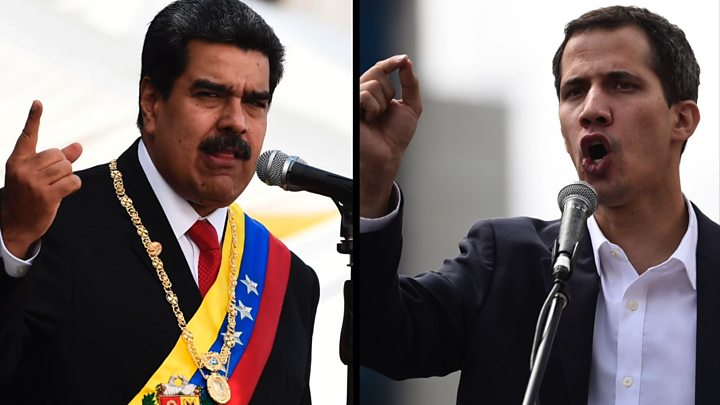
What action is the US taking?
On Monday Mr Bolton announced sanctions against Venezuela's state-owned oil firm PDVSA to ensure that President Maduro could "no longer loot the assets of the Venezuelan people".
He also hinted at possible military action, reiterating that "all options are on the table".
Mr Bolton appeared at a news briefing with a notepad containing the words "5,000 troops to Colombia", which borders Venezuela.
On Tuesday acting US Defence Secretary Patrick Shanahan declined to say whether the Pentagon was considering sending troops. "I haven't discussed that with Secretary Bolton," he told reporters.
Also on Tuesday the state department issued a travel advisory urging US nationals not to go to Venezuela because of "civil unrest, poor health infrastructure, and arbitrary arrest and detention of US citizens".
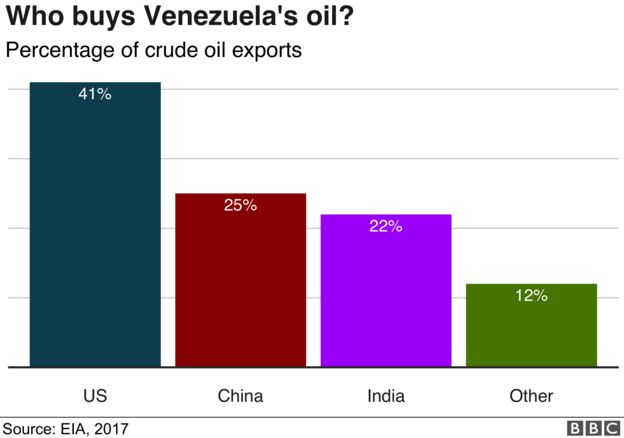

What about other countries?
More than 20 nations have followed the US in recognising Mr Guaidó as interim president.
But other powers including Russia, China, Mexico and Turkey have publicly backed Mr Maduro.
On Tuesday Russian Foreign Minister Sergei Lavrov said the US sanctions violated "all possible international norms" and "pledged to do everything to support the legitimate government of President Maduro".
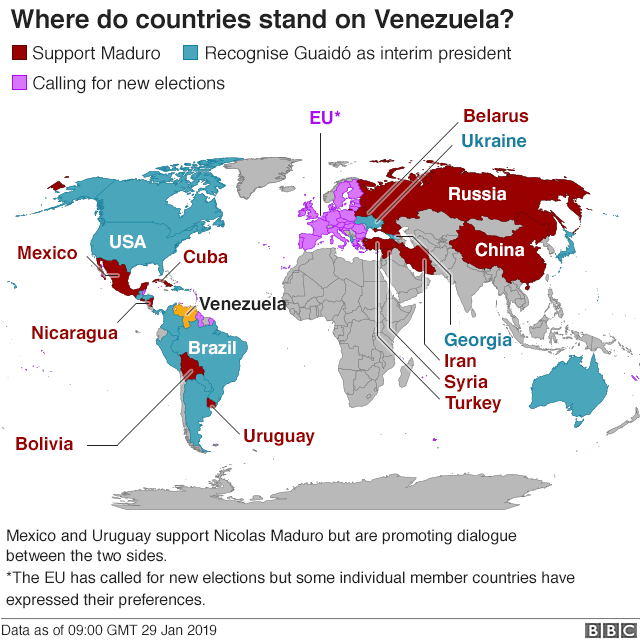

Latin America & Caribbean
Five arrested over Brazil dam collapse
- 29 January 2019
- Business
Bolsonaro has colostomy bag removed
- 28 January 2019
- Latin America & Caribbean
Deaths as rare tornado hits Cuba's capital
- 28 January 2019
- Latin America & Caribbean


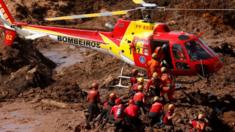

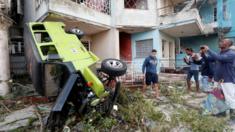
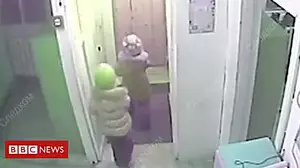
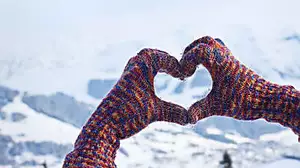
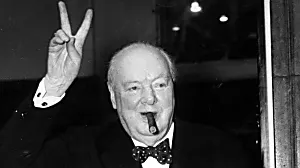
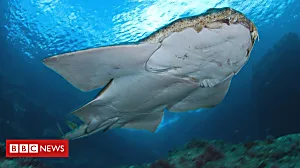
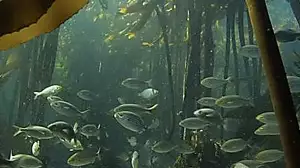
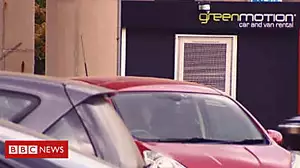
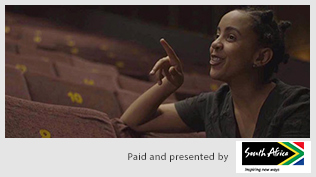
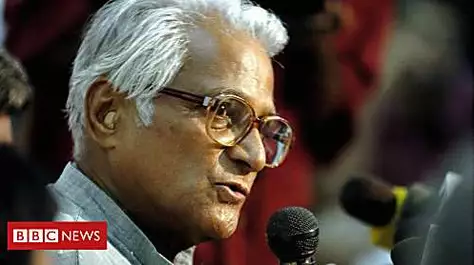
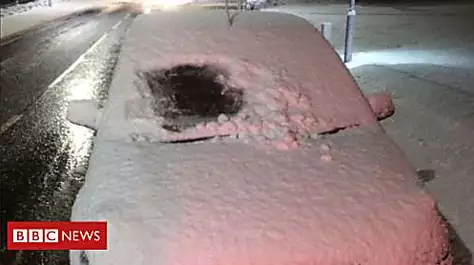
No comments:
Post a Comment